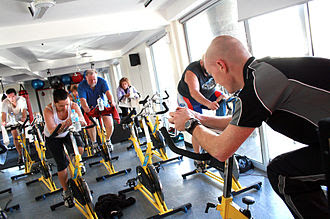

| Online: | |
| Visits: | |
| Stories: |

| Story Views | |
| Now: | |
| Last Hour: | |
| Last 24 Hours: | |
| Total: | |
A dangerous Eden
Tuesday, April 4, 2017 11:57
% of readers think this story is Fact. Add your two cents.
I have been going to the gym. Seriously. For about a couple of months now. I'm doing weight training for the first time in my life, and cardio exercises, including – wonder of wonders – short bursts of running. I'm even paying for a personal trainer. It's a shocking extravagance, but I'm likely to find any excuse under the sun not to do my workouts unless I have someone telling me what to do and shouting at me if I don't do it. As one of my school reports said, “Frances does not enjoy physical exertion”. Truer words were never spoken. Sporty, I am not.
So why am I doing this? It is all because of my family. Specifically, my father. He has serious heart problems, vascular deterioration in his brain and Type II diabetes. And I am a lot like him.
Ok, so he is 83. But he was a lot more active in his 50s than I have become. Since I reduced my singing teaching and took up writing, I have become largely sedentary. Even gardening has gone, killed by a brutal combination of severe hay fever and asthma. And although I enjoy walking, I don't do it nearly enough. It is too easy to hop into the car even for short trips, and longer ones are a rare indulgence in a life dominated by work.
I looked at my father – now slim, after drastically changing his diet when he was diagnosed with Type II diabetes. And I looked at me. And I did not like what I saw. I decided that if I wished to avoid heart problems and diabetes, I had to slim down and get fit. So I went to the gym.
I am far from alone. In a recent panel discussion on the future of work, I asked the audience how many of them went to the gym. A forest of hands went up. It appeared that nearly everyone in the room, young and old, visited a gym. Slimming down and getting fit is fashionable among London office workers.
But back in the nineteenth century, there was no such thing as a gym. Nor would people have visited gyms even if they existed. Even if they could afford them, they did not need them. For the vast majority of people, work itself involved physical exertion. It did not matter whether you were an agricultural labourer, a scullery maid, a cook or one of the thousands of people who worked in factories and mines up and down the land. Work was hard.
There was a lot of it, too. People then worked longer hours than we do now: working days of 10-12 hours were typical. Most people started work when they were children, and continued to work well into old age. The state pension introduced in 1908 set the retirement age at 70 for both men and women. Prior to that, elderly people who could not support themselves were forced into workhouses – where they were, of course, required to work.
Even for people doing desk jobs, such as Dickens' Bob Cratchett, work was physically harder than it is now. Offices were neither centrally heated nor air conditioned, and there was no concept of “ergonomic design”. And Victorian ledgers were no light weight: any clerk lugging those around would have been doing the equivalent of modern weight training. Not to mention dragging in buckets of coal and logs to feed the open fire.
Transport to work also involved what we would now regard as hard work. Most people would have walked to work, often some distance. Even richer people regarded walking long distances as normal: in Jane Austen's Pride and Prejudice, Elizabeth Bennet and her aunt and uncle decide to walk round the Pemberley park on discovering that it is “only 10 miles round”. Admittedly, 10 miles proved too much for her aunt: but when Elizabeth marries Darcy, her aunt observes that a pony and trap would be the very thing in which to tour the park. Riding in an unsprung carriage (or pony trap) might have saved her feet, but it would have used every muscle in her body. Among richer people, horse riding was a common means of transport: but that too involves using muscles that many of us today don't know exist.
In one episode of the BBC's “Victorian Slum” – a well-constructed “living history” programme showing what life was like in the Victorian slums of East London – the historian on the programme, watching young men struggle to lift heavy sacks of meal, observed that Victorian men were fitter and tougher than today's young men. Although their nutrition was far worse than ours today, and there was next to no healthcare, they were used to lifting heavy weights and performing physically demanding manual tasks.
So for our forebears, gyms would have been superfluous. It was the daily grind of living that kept them fit. When they stopped work, they rested. And because there was much work, and little rest, they longed for a world in which there was much rest and little work. Freedom from toil has been the goal of mankind for millenia.
We are hardwired to use our ingenuity to find easier ways of doing things. Our prehistoric ancestors directed their efforts towards making hunting and gathering more efficient: so they invented weapons with which they could kill much larger prey (and could therefore afford to hunt less often), and they invented ways of improving the productivity of plants, so that they need not forage so widely. Eventually, of course, they learned to keep the plants and the prey close to them, so that they could tap them whenever they wanted rather than having to find them. Of course, farming did not eliminate either food scarcity or hard work: but it made them more controllable, especially as humans devised ever more imaginative ways of preserving food.
Now, we create labour-saving devices that reduce the amount of physical effort required to keep a home clean, clothes washed and dinner cooked. We invent machines that eliminate the need for humans to exert themselves physically to produce food. We develop faster and more efficient ways of moving people and goods around. We speak of the “changing nature of work”, as if it were something new: but in reality, the nature of work has been changing for generations, as machines have progressively replaced human muscles. Our worry now is that machines will replace not just our muscles, but our brains.
But progressively replacing human brawn with brain in the world of work is already creating an unexpected problem. Freedom from toil isn't all it is cracked up to be. Our bodies need physical exertion to remain healthy. Sedentary lifestyles shorten people's lives.
So, do we kick out the machines and do the work ourselves? No. We go to the gym. In other words, we pay to do physical hard work for which in the past we would have been paid. Some of us (me) even pay a personal trainer to play the role of the employer that would have told us what to do and shouted at us if we didn't do it well enough.
The burgeoning fitness industry is a fine example of how the changing nature of work sparks new, previously unimaginable types of job. Who, one hundred years ago, would have foreseen that entire factories full of machines would be created not to produce goods, but simply to enable people to stay healthy? Even the treadmill of nineteenth century prisons and workhouses served a useful purpose: it generated energy to power mills. But as far as I know, no-one has yet tried to harness the physical energy that thousands of people waste every day in gyms up and down the country. Mind you, it is surely not going to be long before someone realises that gyms could be self-sufficient in energy and possibly even provide electricity to the local community. Who needs wind or solar, when you have a spinning class?
We also re-create the food scarcity that was the lot of our distant ancestors. Our instinct is to seek out foods that were previously scarce but are now abundant, such as sugar and fat, but we know that indulging our preference is dangerous to our health. So we follow diet plans of varying scientific credibility, and consult dieticians who advise us on what not to eat. We voluntarily restrict both the amount and the variety of food we eat: we may even pay extra for foods that are produced in a less efficient (but more “natural”) way. To the people of the “Victorian slum”, this would have seemed extraordinary.
Indeed, it would seem extraordinary to people in developing countries today. What I describe above are first world problems. At the same time as we are artificially creating hard work and scarcity to preserve our lifespans, our cousins in Africa are doing real hard work and experiencing real scarcity, both of which shorten theirs. The changing nature of work has made our lives too easy, while theirs remain as hard as ever.
But perhaps, in the distant future, even our African cousins will be relieved of the necessity of physical toil, and benefit from the abundance that efficient machine production can deliver. Then our problems will be their problems, and they too will voluntarily pay to work and to starve.
Who would have thought that the Eden of which we have dreamed would be so dangerous for us?
Related reading:
The broken contract - Pieria
Image from Wikipedia.
Source: http://www.coppolacomment.com/2017/04/a-dangerous-eden.html



